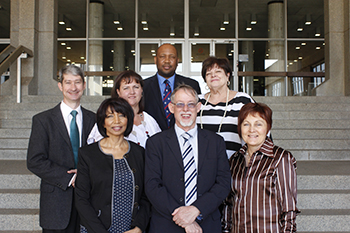Latest News Archive
Please select Category, Year, and then Month to display items
24 July 2024
|
Story Lacea Loader
![]()
The University of the Free State (UFS) is co-hosting the Global Social Innovation Indaba together with Social Innovation Exchange (SIX) on its Bloemfontein Campus from 30 September to 2 October 2024. This event brings together people from different sectors all over the world to discuss how to accelerate and support people-powered
change and create a better society for generations to come.
The UFS is excited to collaborate with SIX, as its vision and values overlap. During this three-day indaba, aspects such as – what it takes to build accountable, inclusive, and participatory institutions, specifically the future role of universities in South Africa – will be discussed. Themes to be explored include young people as drivers of change, post-industrial transitions and community resilience, the role of art, social change and bridging divides, and systemic approaches to dealing with unemployment.
Some of the speakers and participants in the programme include Carla Duprat from ICE (Brazil); Cheryl Jacob from ESquared Investments (South Africa); François Bonnici from the Schwab Foundation for Social Entrepreneurship (Switzerland); Sir Geoff Mulgan from the University College London (UCL) in the United Kingdom; and Dr Narissa Ramdhani from the Ifa Lethu Foundation (South Africa).
The UFS will also use the opportunity to showcase its campus and offerings to attendees, focusing on its transformation story and some of the interdisciplinary forward-thinking programmes. Guests will also be treated to true South African hospitality, laying the foundation for strong relationships and collaboration.
SIX believes in the transformative power of people working together. Exchanges based on mutual value and reciprocity are the missing link in tackling the world’s problems. As a friendly, expert entry point to global social innovation, their work connects organisations, sectors, communities, and nations to build capabilities and create opportunities for collaboration.
New schools, restructuring part of streamlined Faculty of Health Sciences
2017-10-12

From the left, front are: Dr Jocelyn Naicker,
Prof Gert van Zyl, Prof Magda Mulder;
back from left: Prof Chris Viljoen,
Marlene Viljoen, Deputy Director: Faculty of Health Sciences;
Prof Nathaniel Mofolo; and Prof Santie van Vuuren.
Photo: Rulanzen Martin
Numerous developments, such as the creation of two new schools and one newly restructured School of Medicine in the Faculty of Health Sciences at the University of the Free State (UFS), will catapult this renowned faculty to even greater heights.
Five-school structure to increase access
A five-school structure was proposed at the annual Faculty Management retreat in July 2016. The previous three-school model included the Schools of Medicine, Nursing, and Allied Health Professions.
The current School of Medicine has been restructured and will henceforth be known as the School of Clinical Medicine. The Schools of Pathology and Biomedical Sciences have been added to the faculty. “So, three new schools were in fact created within the faculty,” said Prof Gert van Zyl, Dean of the faculty.
“There was also a request from the National Health Laboratory Services to group academics that is rendering services in pathology into a new School of Pathology.” This is what motivated the faculty management to create two new schools.
Esteemed academics appointed
With the creation of the new schools, there were also new appointments within the Faculty of Health Sciences. Dr Jocelyn Naicker has been appointed as the new part-time Head of the School of Pathology, Prof Chris Viljoen was appointed as the part-time Head of the School of Biomedical Sciences, and Prof Nathaniel Mofolo as the new Head of the School of Clinical Medicine. Prof Santie van Vuuren remains Head of the School of Allied Health Professions, and Prof Magda Mulder as the head of the School of Nursing.
Research outputs to remain as usual
The addition of the new schools will not impact research output. “In the past, research was done across departmental boundaries between all the departments in the faculty,” Prof Van Zyl said. The advantages of adding two additional schools are that the workload will be distributed among the five schools. The heads of schools will work within their respective disciplines and related areas, and will eliminate the duplication of administrative functions.